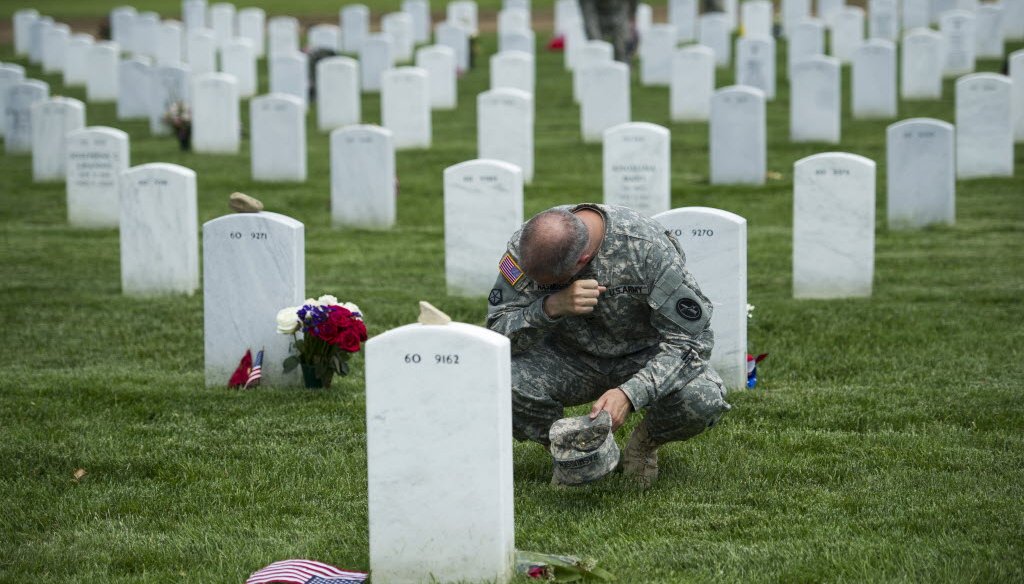Get PolitiFact in your inbox.

An Army colonel wipes away tears as he visits a grave at Arlington National Cemetery while placing flags at grave sites ahead of Memorial Day 2014.
On May 21, 2014, five days before Memorial Day, President Barack Obama addressed the growing furor over allegations of treatment delays and preventable deaths at VA hospitals nationwide.
The Department of Veterans Affairs' inspector general had said 26 facilities are being investigated, including a Phoenix hospital facing accusations that 40 people died while waiting for treatment and staff there kept a secret list of patients in order to hide delays in care.
"I will not stand for it -- not as commander in chief but also not as an American," Obama said.
With veterans top of mind because of the headlines and the Memorial Day holiday, here are six veterans- and military-related articles and Truth-O-Meters ratings from PolitiFact Wisconsin from the past year.
They include factchecks of statements made by Wisconsin congressional representatives Paul Ryan and Gwen Moore, among others. And they cover topics ranging from service members missing in action to military pensions to whether Obama proposed an Army smaller than the one "we had before Pearl Harbor."
Missing In Action
In September 2013, state Veterans Affairs Secretary John Scocos said: "There are still tens of thousands of missing service members from previous and current conflicts that our nation is working to find and repatriate."
We rated his statement True.
One of the federal agencies responsible for searching for the missing, or at least their remains, puts the official count at more than 83,000 -- all of whom, or nearly all of whom, are deceased.
Size of the Army
At a town hall meeting in April 2014, U.S. Rep. Jim Sensenbrenner, R-Menomonee Falls, commented on Defense Secretary Chuck Hagel’s plans to downsize the Army’s troop strength. Obama’s budget, Sensenbrenner claimed, proposed "an Army of fewer personnel than we had before Pearl Harbor."
We found that before the U.S. buildup got cranked up, the Army had 188,000 troops in mid-1939 and 264,000 in mid-1940. Hagel’s plan for 440,000 active troops would still be larger than that, contrary to what Sensenbrenner said. And that doesn't take into account how much more technology and other capabilities today's Army has compared to the one in 1940.
Sensenbrenner got a False.
We’ve also taken on topics that are controversial within the military community.
Military pensions
Some veterans got upset with Ryan, the Janesville Republican and House Budget Committee chairman, for co-brokering a federal budget deal that includes smaller pension payments for younger military retirees.
Defending the deal, which became law, Ryan said in December 2013 that members of the military "don’t contribute toward their pension."
We rated the statement True.
Civilian federal employees contribute a portion of their pay toward their pensions, but members of the military -- aside from any other financial sacrifices they might make while serving -- don’t make such contributions.
Military culture and sex abuse
In May 2013, about a week after a Pentagon report estimated that 26,000 members of the armed forces were sexually assaulted in 2012, Moore, a Milwaukee Democrat, blamed military culture -- "which is about aggression and about war" -- for the military’s sexual assault problem.
Moore's comments and criticism of them from conservative radio talk show hosts led us to publish an In Context article, which provided a transcript of the full remarks she made on MSNBC.
"Well, I can tell you that when you look at the mission of the military and military culture, which is about aggression and about war, it shouldn't surprise us at all that sexual assault would surface as a huge issue that they need to look at," Moore said in part. "And I do think that they would revisit earlier statements to not take this out of the chain of command. We need to look at whether or not the chain of command can deal with the multitude issues that arise out in sexual assaults."
Civil War veterans
In June 2013, we rated as Pants on Fire a statement by the president of the National Black Chamber of Commerce that the National Rifle Association was "founded by religious leaders who wanted to protect freed slaves from the Ku Klux Klan."
We became aware of the statement because it was from video that the Republican Party of Milwaukee County had posted on its website.
The NRA itself says the group was formed by Union Civil War veterans to improve soldiers’ marksmanship. And we found no evidence that religious leaders founded the NRA to protect freed slaves from the KKK.
Asbestos-caused cancer
In March 2014, state Senate Minority Leader Chris Larson, D-Milwaukee, said the Republican-controlled Senate had approved a bill "denying veterans the right to recover their medical costs for cancers they developed while serving their country."
We rated his statement Mostly False.
The bill, which was signed by Walker, doesn’t target veterans nor deny their right to seek compensation, both from existing and now-bankrupt asbestos-related companies, for cancer they contracted as a result of serving in the military.
But Larson’s claim contained an element of truth. Some veterans might collect less money from legal actions than they could under the previous system for seeking compensation.
To comment on this item, go to the Milwaukee Journal Sentinel’s web page.
Our Sources
PolitiFact Wisconsin articles as noted




























